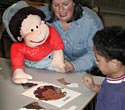SEL Parent Workshops: How Group Dynamics Enhance Problem-Solving and Parenting Skills

Check out our blog for social-emotional learning articles, news, and more!
 The authors studied the effectiveness of parent and teacher training as a selective prevention program for 272 Head Start mothers and their 4-year-old children and 61 Head Start teachers. Fourteen Head Start centers (34 classrooms) were randomly assigned to (a) an experimental condition in which parents, teachers, and family service workers participated in the prevention program (Incredible Years) or (b) a control condition consisting of the regular Head Start program. Assessments included teacher and parent reports of child behavior and independent observations at home and at school. Construct scores combining observational and report data were calculated for negative and positive parenting style, parent-teacher bonding, child conduct problems at home and at school, and teacher classroom management style.
The authors studied the effectiveness of parent and teacher training as a selective prevention program for 272 Head Start mothers and their 4-year-old children and 61 Head Start teachers. Fourteen Head Start centers (34 classrooms) were randomly assigned to (a) an experimental condition in which parents, teachers, and family service workers participated in the prevention program (Incredible Years) or (b) a control condition consisting of the regular Head Start program. Assessments included teacher and parent reports of child behavior and independent observations at home and at school. Construct scores combining observational and report data were calculated for negative and positive parenting style, parent-teacher bonding, child conduct problems at home and at school, and teacher classroom management style.
Following the 12-session weekly program, experimental mothers had significantly lower negative parenting and significantly higher positive parenting scores than control mothers. Parent-teacher bonding was significantly higher for experimental than for control mothers. Experimental children showed significantly fewer conduct problems at school than control children. Children of mothers who attended 6 or more intervention sessions showed significantly fewer conduct problems at home than control children. Children who were the 'highest risk' at baseline (high rates of noncompliant and aggressive behavior) showed more clinically significant reductions in these behaviors than high-risk control children. After training, experimental teachers showed significantly better classroom management skills than control teachers.
One year later the experimental effects were maintained for parents who attended more than 6 groups. The clinically significant reductions in behavior problems for the highest risk experimental children were also maintained. Implications of this prevention program as a strategy for reducing risk factors leading to delinquency by promoting social competence, school readiness, and reducing conduct problems are discussed.





